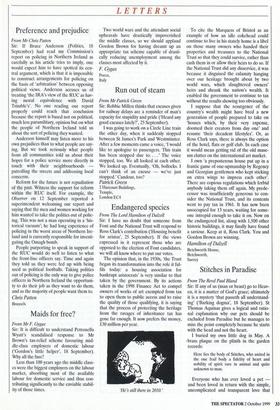LETTERS
. Preference and prejudice
From Mr Chris Patten Sir: If Bruce Anderson (Politics, 18 September) had read my Commission's report on policing in Northern Ireland as carefully as his article tries to imply, one would expect him to have spotted its cen- tral argument, which is that it is impossible to construct arrangements for policing on the basis of 'arbitration' between opposing political views. Anderson accuses us of treating 'the IRA's view of the RUC as hav- ing moral equivalence with David Trimble's'. No one reading our report properly could reach that conclusion because the report is based not on political, much less paramilitary, opinion but on what the people of Northern Ireland told us about the sort of policing they wanted.
Anderson himself may listen more to his own prejudices than to what people are say- ing. But we took seriously what people from all communities told us about their hopes for a police service more directly in touch with their neighbourhoods — patrolling the streets and addressing local concerns.
Reform for the future is not repudiation of the past. Witness the support for reform within the RUC itself. For example, the Observer on 12 September reported a superintendent welcoming our report and saying that the men and women working for him wanted to take the politics out of polic- ing. This was not a man operating in a 'his- torical vacuum': he had long experience of policing in the worst areas of Northern Ire- land and is currently responsible for investi- gating the Omagh bomb.
People purporting to speak in support of the RUC would do well to listen to what the front-line officers say. Time and again they told us they were fed up with being used as political footballs. Taking politics out of policing is the only way to give police officers in Northern Ireland the opportuni- ty to do their job as they want to do them, and as the majority of people want them to. Chris Patten Brussels










































































 Previous page
Previous page